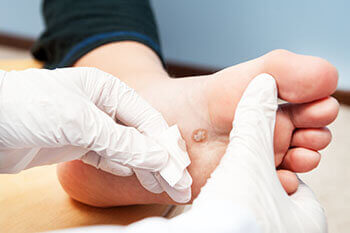
Plantar Warts Symptoms and Complications
If you notice small bumps around the heel or weight-bearing areas of your feet, you may have developed plantar warts. When the HPV virus enters the skin through an opening, such as a small cut or scrape, plantar warts can form and often cause discomfort. Some indicators that you have plantar warts include feeling pain in the soles of the feet when standing or walking and the formation of small fleshy growths, sometimes including a tiny black dot in the center of the bump.
Plantar warts can cause some pain while standing, sometimes felt as tenderness on the sole of your foot. Unless the wart has grown into the foot behind a callus, you will be able to see the fleshy wart. Because plantar warts are not cancerous or dangerous, a podiatrist should only be consulted if there is an excess amount of pain associated with having them, if they are affecting your walking, or if they continually come back. However, anyone who suffers from diabetes or a compromised immune system disease should seek out care immediately.
Plantar Warts Causes and Prevention
To best prevent getting plantar warts, it’s advised to keep your hands and feet clean and wash them regularly. It’s also important to ensure you wear appropriate footwear in public areas such as swimming pools, locker rooms, and communal showers. Because plantar warts are contagious, it’s especially important for those with a weaker immune system to make sure they take the above precautions. If you believe you’ve developed plantar warts and are experiencing severe pain, swelling, redness, or bleeding, it’s advised to seek professional care.
HPV causes plantar warts to form and is very common. There are more than 100 kinds of the virus in existence. However, only a few of them cause warts on the feet. The other types of HPV are likely to cause warts on other parts of the body.
For more information about plantar warts, we recommend you consult with a podiatrist for a proper diagnosis and advised treatment plan.
